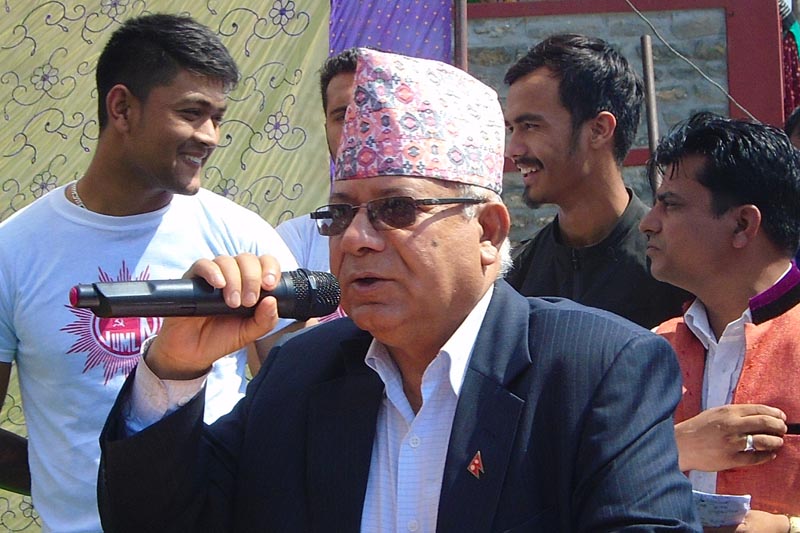NCP leaders vent anger on leadership
- Their frustration stems from the decision to keep them away from tea parties
Kathmandu, November 6
Senior leaders of the ruling Nepal Communist Party (NCP), including Madhav Kumar Nepal, have expressed deep dissatisfaction over, what they call, ‘leadership’s deliberate attempts to keep them on the sidelines’ during party integration process at provincial and local levels.
Their frustration stems from leadership’s decision to keep them away from tea parties hosted by the CPN in different parts of the country on the occasion of Dashain, Tihar and Chhath festivals.
The NCP was formed following merger between CPN-UML and CPN-Maoist Centre. Although the party consolidation process has been completed at the central level, it has not started in provinces and the local levels.
The NCP has appointed Home Minister Ram Bahadur Thapa and NCP General Secretary Bishnu Poudel to chart out a plan to complete unification at the provincial and local levels and assign responsibilities to party members accordingly. Thapa and Poudel have also been asked to devise operation plans for provincial and districts committees.
Nepal-led group has claimed that Thapa and Poudel are planning to reduce the influence of the senior leader in the party by allocating only 10 leadership posts at the district level. “This is not fair because party members who support Nepal had occupied 47 leadership posts at the district level in the erstwhile CPN-UML,” an NCP leader said on condition of anonymity.
The new revelation comes at a time when Nepal-led group has been expressing dissatisfaction with party leadership’s move to turn the party secretariat into the most powerful body in the CPN.
“Ideally, the central committee should be the most powerful body in the party. It should, in fact, be the party’s executive branch. If this is not possible, power should rest in the standing committee,” the leader said.
The NCP’s central committee has 441 members. A third of them will make it to the politburo, which is yet to be formed. A third of the politburo members are then elevated to the standing committee, which has been formed and comprises 45 members. Around a third of the standing committee members are then dispatched to the party secretariat, which has also been formed and consists of nine members.
“At the moment, the secretariat is the most powerful body in the CPN. But even among secretariat members only a few wield most of the powers, keeping senior leaders at bay,” the leader said, adding, “Look at the way NCP Co-chairperson Pushpa Kamal] Dahal and Poudel attended tea receptions together in different parts of the country without inviting other senior leaders. Because of this attitude, NCP standing committee member Ghanshyan Bhusal boycotted tea reception in his home district, Rupandehi.”
As only a few leaders have been assigned key roles in the party, party unification process at provincial and local level has come to a halt, one of the party secretariat members said. Because of this delay, provincial party members have taken the initiative to unify the party at the local level, although responsibilities have not been assigned to individuals.
“The prolonged delay has agitated party members at the grassroots, as they have not been able to play any role at the local level,” the source said.
Prime Minister KP Sharma Oli and Dahal, the two NCP co-chairpersons, met on Sunday to discuss the party unification process at all levels. Dahal then discussed this issue with Nepal on Monday. The two NCP co-chairpersons are planning to unify the party at all levels by mid-December.
“The unification process will be finalised by the standing committee based on the report submitted by Thapa and Poudel,” NCP Spokesperson Narayan Kaji Shrestha said.






